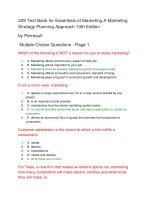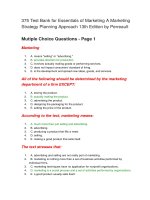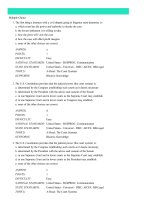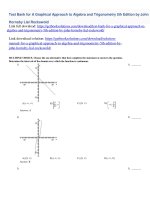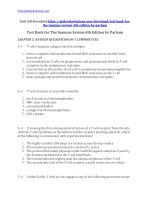Test bank for andersons nursing leadership management and professional practice for the LPN LVN in nursing school and beyond 5th edition by tamara
Bạn đang xem bản rút gọn của tài liệu. Xem và tải ngay bản đầy đủ của tài liệu tại đây (313.28 KB, 23 trang )
Link full download: />
Test Bank for Andersons Nursing Leadership Management and
Professional Practice For The LPN/LVN In Nursing School and Beyond
5th Edition by Tamara
Sample
Chapter 15: Welcome to Conflict
Multiple Choice
Identify the choice that best completes the statement or answers the question.
____ 1. Poorly managed conflict:
1.
is inevitable.
2.
is a result of putting nurses in management roles.
3.
results in lowered productivity.
4.
is caused by autocratic managers.
____ 2. Well-managed conflict:
1.
can stimulate competition.
2.
identifies legitimate differences.
3.
serves as a strong motivator for employees.
4.
All of the above are correct.
____ 3. Conflict is best handled by:
1.
managing it.
2.
avoidance behavior.
3.
aggressive management.
4.
passive management.
____ 4. Category-two conflict, or mental struggle resulting from incompatible or
opposing needs, drives, wishes, or internal or external demands, is best demonstrated by
which scenario?
1.
Students compete for front-row seating in the classroom.
2.
A student disagrees with an instructor’s point of view.
3.
A student is unhappy with her clinical assignment due to
attitudes of staff.
4.
Two nurses bicker over who gets which patient
assignments.
____ 5. Category-three conflict is best demonstrated by which scenario?
1.
Students compete to register early for favorite classes.
2.
Two nurse’s aides argue about whose turn it is to take
care of a belligerent patient.
3.
A husband and wife argue about the time the wife spends
on her nursing studies.
4.
Faculty compete for merit raises.
____ 6. In order for you to understand conflict, you must be able to:
1.
quickly judge the behavior of those involved.
2.
identify the conflict and its category.
3.
manage the conflict yourself.
4.
realize that conflict is inevitable.
____ 7. A strong and frequent cause of conflict for licensed practical nurses (LPNs) is:
1.
scarce resources.
2.
family problems.
3.
unclear roles.
4.
competition among staff nurses.
____ 8. As an LPN charge nurse, one of the best actions you can take when there is a
problem of scarce resources is to:
1.
be proactive and manage potential conflict.
2.
wait until a decision has to be made.
3.
keep everyone at a distance.
4.
do nothing and wait until your supervisor gives you
directions.
____ 9. The most effective way for you, the charge nurse, to manage perceived
conflict is to:
1.
wait until the argument takes place, because you are only
relying on your feelings.
2.
have individual conversations with those you think sense
these feelings.
3.
bring everyone together in the same meeting to express
feelings.
4.
be aggressive in getting answers to your questions.
____ 10. The greatest cause of conflict is:
1.
uncaring and aggressive nurses.
2.
managers who distance themselves.
3.
an unresolved conflict.
4.
a manager who uses win–lose strategies.
____ 11. Which of the following conflict management strategies is considered the most
desirable?
1.
Win–win
2.
Win–yield
3.
Win–lose
4.
Yield–lose
____ 12. You work on a skilled unit in a long-term care facility. Over the past several
months, there has been conflict over the schedule. Your manager should use which of the
following methods to resolve this conflict successfully?
1.
Staff meetings so that everyone can state their complaints
about the schedule
2.
Ask the director of nursing to step in and settle the
problem once and for all.
3.
Use the process of negotiation.
4.
Inform the staff that the schedule will be followed
without further changes or discussion.
____ 13. Which of the following techniques should be used when a staff member has
lost his or her temper?
1.
Do what comes naturally and respond with anger.
2.
Listen in a respectful, polite way.
3.
Ask the staff member why he or she is angry.
4.
Refuse to listen to this person because he or she is simply
too upset at this point.
____ 14. What is your responsibility in a threatening situation with a staff member on
your unit?
1.
Protect yourself; do not worry about others at this time.
2.
Attempt to remove the person from the unit.
3.
Immediately call the police.
4.
Protect yourself, other employees, and patients and their
families.
____ 15. What is the term for listening respectfully and not responding with anger to
another who is angry?
1.
Negotiation
2.
Good management
3.
White out
4.
Brown out
____ 16. When negotiating because of a conflict you should:
1.
quickly respond with an answer.
2.
take what is said personally; after all, this conflict does
affect you.
3.
respond with criticism.
4.
identify the need that the person is expressing.
____ 17. In which of the following situations is conflict always present?
1.
Lose–lose
2.
Yield–lose
3.
Win–yield
4.
Win–lose
____ 18. Which of the following theories will help you develop a positive approach to
conflict?
1.
Caring theory
2.
Transactional analysis theory
3.
Maslow’s theory
4.
Lewin’s theory
____ 19. In the ideal work situation what description of conflict is best?
1.
There is no conflict and everyone gets along.
2.
Some conflict is beneficial to the organization.
3.
Frequent conflict arises and almost everyone conflicts
daily.
4.
A constant state of conflict with many angry people
____ 20. A coworker makes nasty comments to the nurse and the nurse notices the
coworker shooting dirty looks at the nurse. The nurse approaches the coworker and says,
“You seem angry with me. Can we talk about what’s bothering you?” The coworker
responds, “I’m not angry with you. Everything is fine.” What behavior is this coworker
demonstrating?
1.
Conflict management
2.
Conflict control
3.
Passive-aggressive
4.
Aggressive
Multiple Response
Identify one or more choices that best complete the statement or answer the question.
____ 21. What are causative factors for how conflict occurs in the nurse’s work
environment? (Select all that apply.)
1.
Competitve actions of incompatibles
2.
Mental struggle between opposing internal or external
demands
3.
Hostile encounter or collision
4.
Intrinsic human behavior
5.
Mental illness
____ 22. What are the never-changing rules of conflict the nurse must know about a
conflict situation? (Select all that apply.)
1.
Conflict is inevitable.
2.
Results of conflict can be constructive.
3.
Conflict is often best managed by ignoring it.
4.
Violence is sometimes essential to conflict.
5.
Conflict is an indication of a lack of education.
____ 23. The nurse is negotiating as the first step toward conflict resolution after
finding two coworkers arguing in the medication room. What rules must the nurse know
to negotiate successfully between these two coworkers? (Select all that apply.)
1.
Don’t take what is said personally.
2.
Don’t get defensive.
3.
Identify the need being expressed.
4.
Determine which person is willing to concede their need.
5.
Be prepared to choose a winner.
____ 24. Category one, or the conflict from competitive or opposing actions, is shown
by: (Select all that apply.)
1.
two friends who have a disagreement.
2.
racial prejudice.
3.
students who compete for an “A” in a course.
4.
an ongoing feud between two neighbors.
5.
an argument between siblings.
____ 25. When an LPN distances coworkers, what is the result? (Select all that apply.)
1.
It brings the staff too close together.
2.
It causes others on the staff to feel left out.
3.
It increases personal conflicts among staff.
4.
It causes the rest of the staff to “white out.”
5.
It creates a warm, caring workplace.
Chapter 15: Welcome to Conflict
Answer Section
MULTIPLE CHOICE
1. ANS: 3
Poorly managed conflict can create distance and distrust among employees and lead to
lowered productivity or less attention to the quality indicators of patient care.
PTS: 1
REF: Chapter: 15
OBJ: Objective: 1
KEY: Content Area: Conflict | Integrated Processes: Communication and Documentation
| Client Need: Safe, Effective Care Environment | Cognitive Level: Knowing
2. ANS: 4
Well-managed conflict can stimulate competition, identify legitimate differences and
problems in an organization, and serve as a strong motivator for employees.
PTS: 1
REF: Chapter: 15
OBJ: Objective: 1
KEY: Content Area: Conflict | Integrated Processes: Communication and Documentation
| Client Need: Safe, Effective Care Environment | Cognitive Level: Knowing
3. ANS: 1
Currently, sociologists say that conflict should not be encouraged or discouraged, but
when it occurs, it must be managed.
PTS: 1
REF: Chapter: 15
OBJ: Objective: 4
KEY: Content Area: Conflict | Integrated Processes: Communication and Documentation
| Client Need: Safe, Effective Care Environment | Cognitive Level: Knowing
4. ANS: 1
When individuals or groups of people participate in a mental struggle resulting from
incompatible or opposing needs, drives, wishes, or external or internal demands, they
have a category-two conflict. This is a conflict that often focuses on the distribution of
scarce resources.
PTS: 1
REF: Chapter: 15
OBJ: Objective: 2
KEY: Content Area: Conflict | Integrated Processes: Communication and Documentation
| Client Need: Safe, Effective Care Environment | Cognitive Level: Knowing
5. ANS: 2
The third category of conflict is a hostile encounter or a collision.
PTS: 1
REF: Chapter: 15
OBJ: Objective: 2
KEY: Content Area: Conflict | Integrated Processes: Communication and Documentation
| Client Need: Safe, Effective Care Environment | Cognitive Level: Knowing
6. ANS: 4
Conflict is a reality that is present in all aspects of life, and also in all organizations
because of their complexity and the multiple interactions of those who work in these
organizations. Conflict is inevitable.
PTS: 1
REF: Chapter: 15
OBJ: Objective: 1
KEY: Content Area: Conflict | Integrated Processes: Communication and Documentation
| Client Need: Safe, Effective Care Environment | Cognitive Level: Understanding
7. ANS: 3
Unclear roles for LPNs are a potential source of conflict. The way that LPNs are assigned
in healthcare often leads to unclear roles. To alleviate or prevent any conflict when a
change in assignment is taking place, the LPN should clarify with management the extent
of the role and the length of time this change will remain in effect.
PTS: 1
REF: Chapter: 15
OBJ: Objective: 2
KEY: Content Area: Conflict | Integrated Processes: Communication and Documentation
| Client Need: Safe, Effective Care Environment | Cognitive Level: Knowing
8. ANS: 1
A problem of scarce resources calls for you to be proactive and manage potential
conflicts before they escalate into unmanageable situations.
PTS: 1
REF: Chapter: 15
OBJ: Objective: 3
KEY: Content Area: Conflict | Integrated Processes: Communication and Documentation
| Client Need: Safe, Effective Care Environment | Cognitive Level: Understanding
9. ANS: 2
Perceived or felt conflict is the feeling you have when you think someone is upset with
you. When there is a perceived conflict, for any reason, people feel that something is
going to happen. They are nervous and edgy, so it is important for you to talk to people
individually in a pleasant and caring manner about their perception of the situation. After
you have obtained enough information, you can return to the group and share the
information with them.
PTS: 1
REF: Chapter: 15
OBJ: Objective: 4
KEY: Content Area: Conflict | Integrated Processes: Communication and Documentation
| Client Need: Safe, Effective Care Environment | Cognitive Level: Understanding
10. ANS: 3
Unresolved conflict is the greatest cause of conflict, which occurs when an individual is
aggressive and devalues another person. Angry feelings remain unresolved because the
devalued person does not know how to manage the conflict.
PTS: 1
REF: Chapter: 15
OBJ: Objective: 2
KEY: Content Area: Conflict | Integrated Processes: Communication and Documentation
| Client Need: Safe, Effective Care Environment | Cognitive Level: Knowing
11. ANS: 1
A win–win strategy is the most effective conflict management strategy because it brings
out the best in people. This strategy is based on caring theory, and it values others and
their ideas.
PTS: 1
REF: Chapter: 15
OBJ: Objective: 4
KEY: Content Area: Conflict | Integrated Processes: Communication and Documentation
| Client Need: Safe, Effective Care Environment | Cognitive Level: Knowing
12. ANS: 3
Your nurse manager should use negotiation to resolve this conflict because it has come
up repeatedly and negotiation is necessary for a win–win result. Telling the staff what to
do will only temporarily solve the conflict, while the problem with the schedule will
continue to exist.
PTS: 1
REF: Chapter: 15
OBJ: Objective: 4
KEY: Content Area: Conflict | Integrated Processes: Communication and Documentation
| Client Need: Safe, Effective Care Environment | Cognitive Level: Applying
13. ANS: 2
A good technique for dealing with this situation is to stop and listen without returning the
anger. Returning the anger only makes the situation worse.
PTS: 1
REF: Chapter: 15
OBJ: Objective: 4
KEY: Content Area: Conflict | Integrated Processes: Communication and Documentation
| Client Need: Safe, Effective Care Environment | Cognitive Level: Understanding
14. ANS: 4
In a threatening situation, you should white out and give the person what he or she wants.
Let the person go and then call security. Your responsibility is to protect yourself, other
staff, and patients and their families.
PTS: 1
REF: Chapter: 15
OBJ: Objective: 3
KEY: Content Area: Conflict | Integrated Processes: Communication and Documentation
| Client Need: Safe, Effective Care Environment | Cognitive Level: Understanding
15. ANS: 3
White out means that you do not respond to a person who is angry, but you stop and listen
to the angry person in a respectful and polite way.
PTS: 1
REF: Chapter: 15
OBJ: Objective: 5
KEY: Content Area: Conflict | Integrated Processes: Communication and Documentation
| Client Need: Safe, Effective Care Environment | Cognitive Level: Knowing
16. ANS: 4
A rule of successful negotiation is that you identify the need the employee is expressing.
You cannot solve a problem when you do not know the need that is not being met. You
need to use Maslow’s hierarchy of needs.
PTS: 1
REF: Chapter: 15
OBJ: Objective: 6
KEY: Content Area: Conflict | Integrated Processes: Communication and Documentation
| Client Need: Safe, Effective Care Environment | Cognitive Level: Understanding
17. ANS: 1
Conflict is active and always present in a lose–lose situation. There are never winners
when this management style is used. Anger and frustration are constantly present, and
most people will not remain in this work environment.
PTS: 1
REF: Chapter: 15
OBJ: Objective: 4
KEY: Content Area: Conflict | Integrated Processes: Communication and Documentation
| Client Need: Safe, Effective Care Environment | Cognitive Level: Knowing
18. ANS: 2
Transactional analysis is a theory of human behavior. This theory provides a framework
for thinking about life in a positive way and shows you how to develop a positive
approach to conflict and its management.
PTS: 1
REF: Chapter: 15
OBJ: Objective: 3
KEY: Content Area: Conflict | Integrated Processes: Communication and Documentation
| Client Need: Safe, Effective Care Environment | Cognitive Level: Understanding
19. ANS: 2
Some conflict is desirable because conflict is necessary to bring awareness of needs and
act as an impetus to make changes.
PTS: 1
REF: Chapter: 15
OBJ: Objective: 1
KEY: Content Area: Conflict | Integrated Processes: Communication and Documentation
| Client Need: Safe, Effective Care Environment | Cognitive Level: Applying
20. ANS: 3
The coworker is demonstrating passive-aggressive behavior, which includes angry body
language and nasty comments while denying there is a problem.
PTS: 1
REF: Chapter: 15
OBJ: Objective: 4
KEY: Content Area: Conflict | Integrated Processes: Communication and Documentation
| Client Need: Safe, Effective Care Environment | Cognitive Level: Applying
MULTIPLE RESPONSE
21. ANS: 1, 2, 3
The conflict that results from competitive or opposing actions of incompatible people or
ideologies is common in most people’s lives. Some people, groups, and whole societies
are simply incompatible. When individuals or groups of people participate in a mental
struggle resulting from incompatible or opposing needs, drives, wishes, or external or
internal demands, they have a category-two conflict. This is a conflict that often focuses
on the distribution of scarce resources. The third category of conflict is a hostile
encounter or a collision.
PTS: 1
REF: Chapter: 15
OBJ: Objective: 2
KEY: Content Area: Conflict | Integrated Processes: Communication and Documentation
| Client Need: Safe, Effective Care Environment | Cognitive Level: Applying
22. ANS: 1
Conflict is inevitable is rule one, and it can be found everywhere. The results of conflict
can be constructive if there is a complete analysis of the conflict before its escalation to
unmanageable proportions.
PTS: 1
REF: Chapter: 15
OBJ: Objective: 2
KEY: Content Area: Conflict | Integrated Processes: Communication and Documentation
| Client Need: Safe, Effective Care Environment | Cognitive Level: Applying
23. ANS: 1, 2, 3
The information you have asked for may be negative about the organization, you as a
manager, or your best friend who also works on the unit. Don’t take it personally. Just
listen, and try to identify the core of the problem. Often when people are criticized in an
angry manner, it is natural to become defensive and protect their ego, job, friend, or
whatever is being criticized. Don’t do what comes naturally. Don’t get defensive. Identify
the need being expressed because it will help to identify the problem at the heart of the
argument.
PTS: 1
REF: Chapter: 15
OBJ: Objective: 6
KEY: Content Area: Conflict | Integrated Processes: Communication and Documentation
| Client Need: Safe, Effective Care Environment | Cognitive Level: Applying
24. ANS: 2, 4
Category one conflict results from competitive or opposing actions of incompatible
people, groups, or whole societies. Family feuds, wars, and all racial prejudice are
examples of this type of conflict.
PTS: 1
REF: Chapter: 15
OBJ: Objective: 2
KEY: Content Area: Conflict | Integrated Processes: Communication and Documentation
| Client Need: Safe, Effective Care Environment | Cognitive Level: Knowing
25. ANS: 2, 3
The result of the LPN distancing others is that they feel discriminated against or left out,
while some may feel that they are not good enough for this person. Distancing also
increases the potential for conflict and a lack of camaraderie among the staff.
PTS: 1
REF: Chapter: 15
OBJ: Objective: 3
KEY: Content Area: Conflict | Integrated Processes: Communication and Documentation
| Client Need: Safe, Effective Care Environment | Cognitive Level: Understanding
Andersons Nursing Leadership Management and Professional Practice: 5th Edition Test
Bank – Dahlkemper
